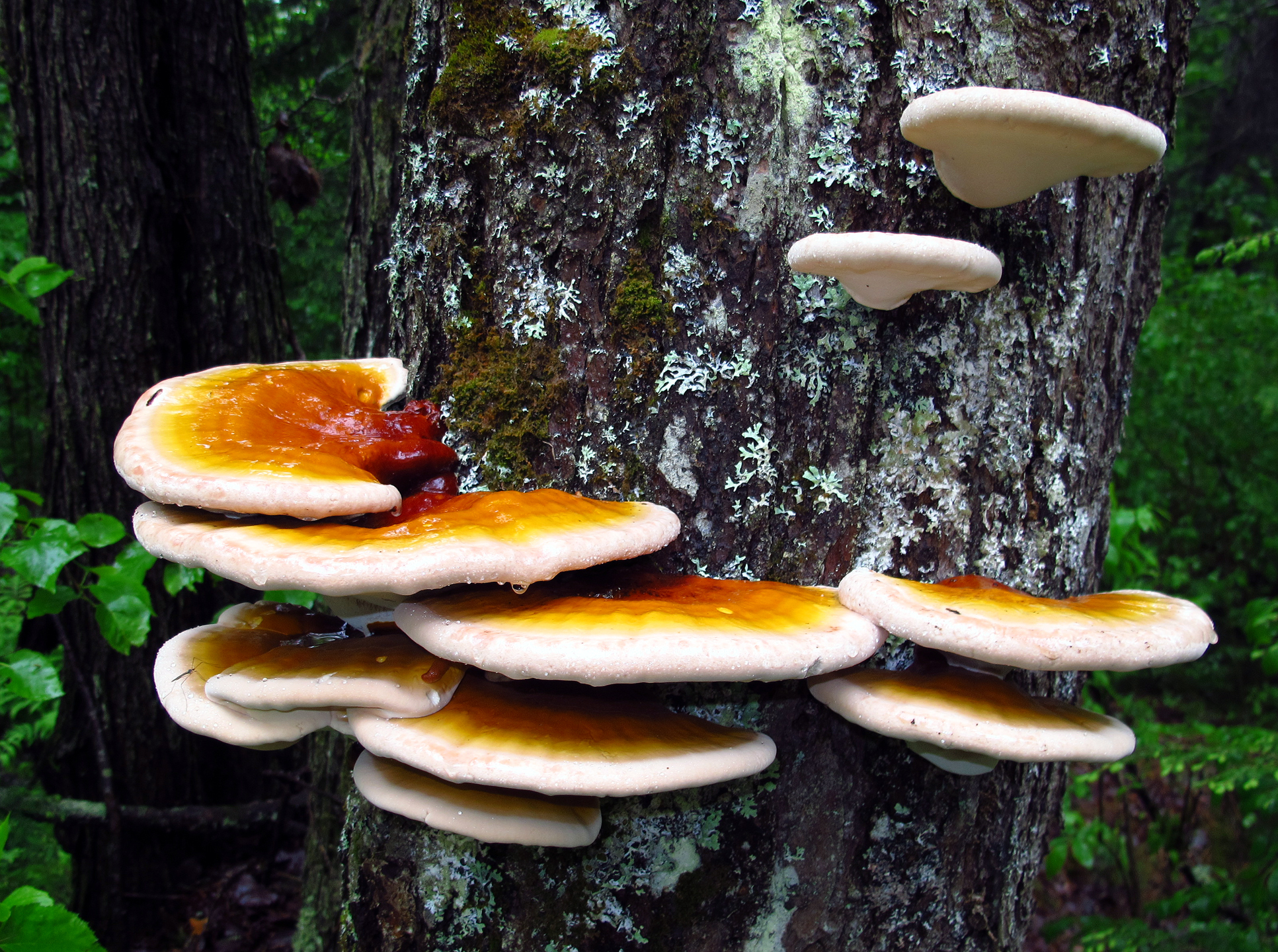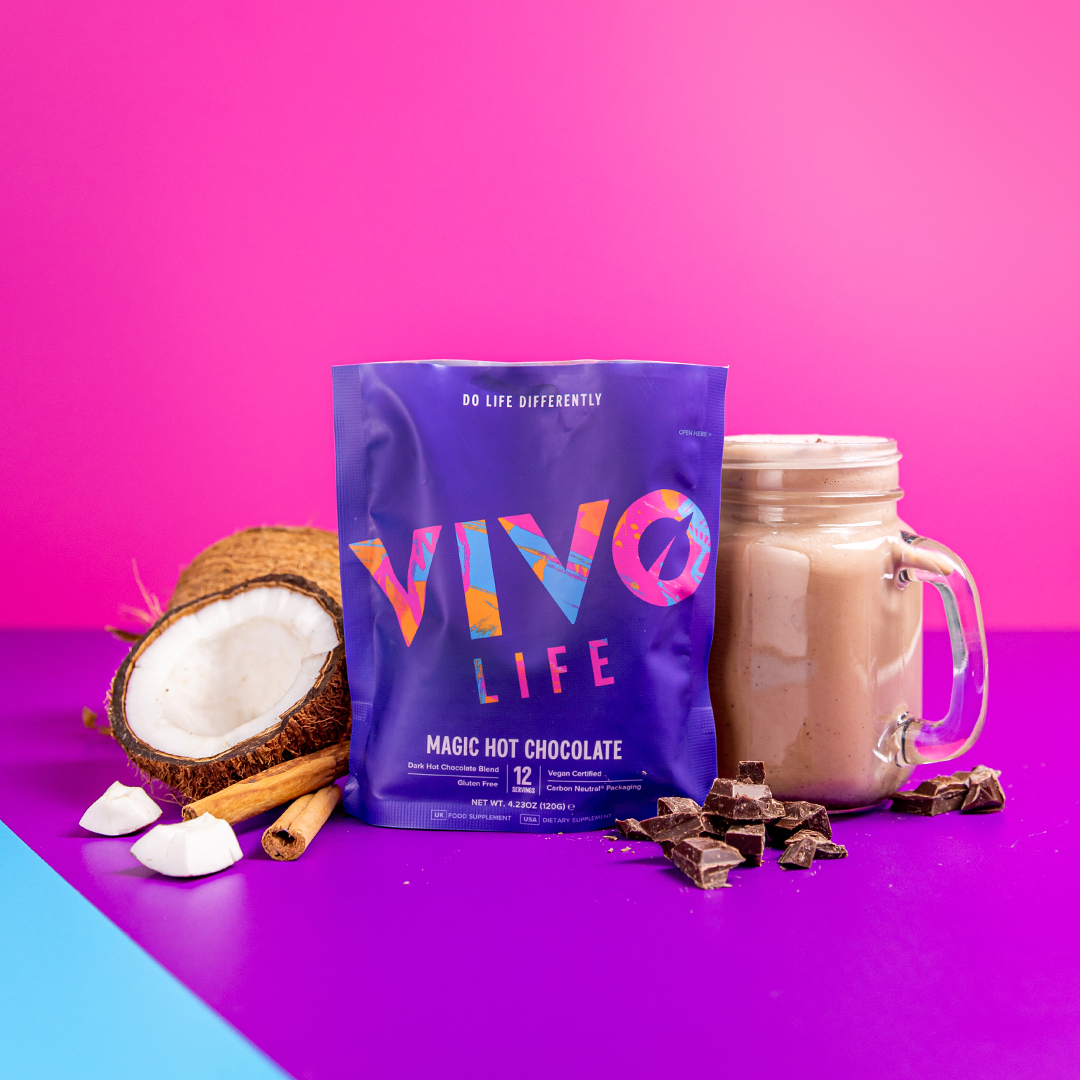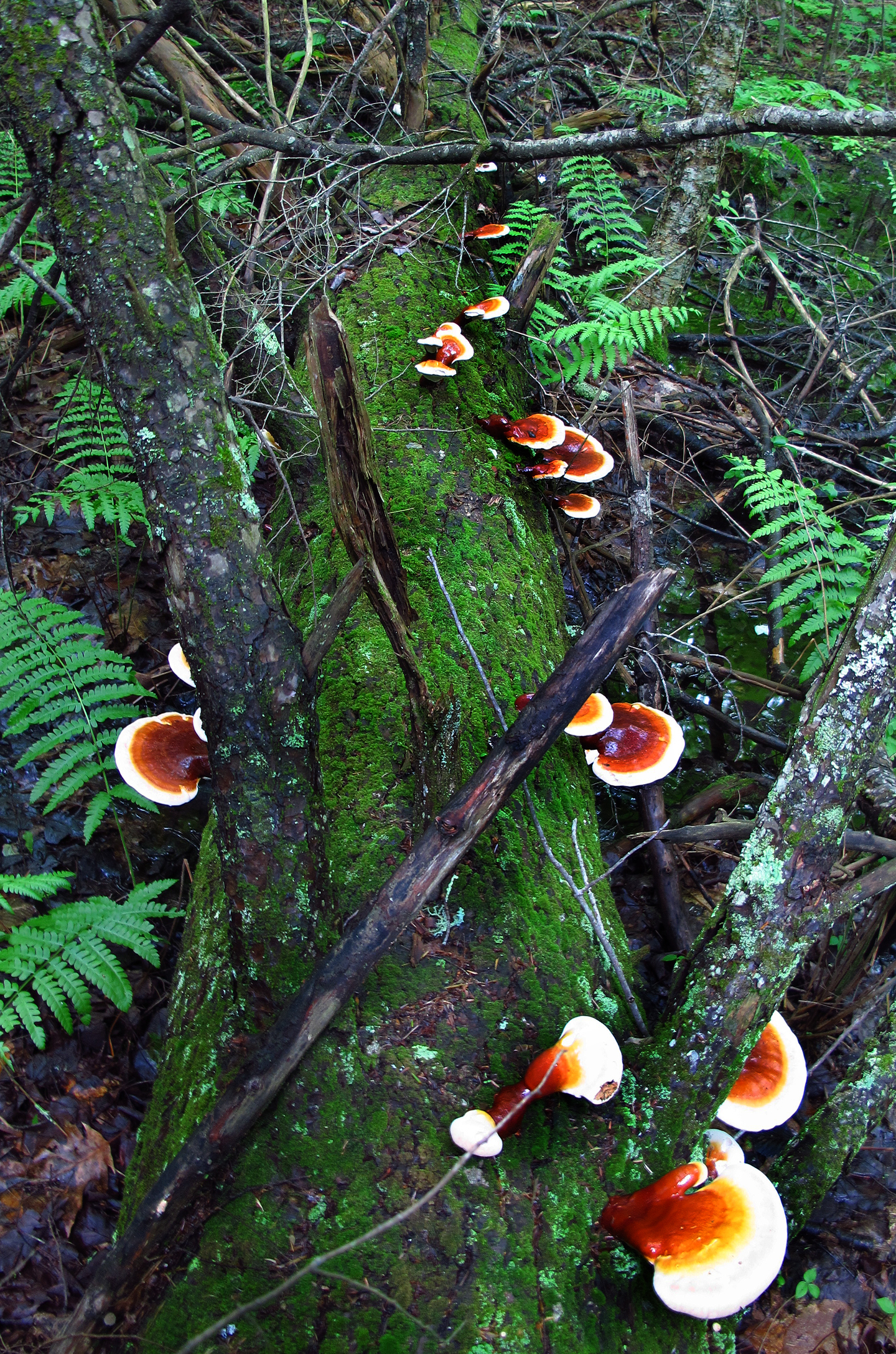REISHI
Updated
by Georgina Roberts
What is Reishi?
Reishi (Ganoderma lucidum) is an adaptogenic mushroom that has been celebrated in Eastern medicine for millennia for its far-reaching healthful benefits, it was known in Chinese Medicine as Lingzhi which translates as the “mushroom of immortality”. It is one of the most studied herbal nutraceuticals and has been used safely and effectively for millennia.

You will find Reishi in our MAGIC hot chocolate and some PERFORM flavours. It has been used for its medicinal potential for over 4000 years and documented in many ancient manuscripts. The ancients believed Reishi could help you to lead a long and vibrant life, and whilst Reishi may not make you live forever, its potential to positively affect health on a whole-body level is vast.
Traditionally Reishi was used by Taoist monks in China to encourage calmness, tranquil states, improve meditation and focus and to encourage longevity. The mushroom was incredibly rare and was often reserved only for those of a higher social status, cherished by Emperors and holy men alike. We use the mushroom “fruiting body”, the actual mushroom opposed to the wispy root network known as the mycelium. The fruiting body contains higher concentrations of the bio-active compounds that are beneficial to us.
Reishi has been researched extensively for its potential impact on many areas of health and overall longevity. The following information should not be substituted for medical advice concerning health conditions. If you are unsure if Reishi could be of benefit to you, your doctor or clinical nutritionist will be able to advise.
How to use Reishi.
Our MAGIC hot chocolate contains a functional dose of 500mcg of reishi per serving. Some of our PERFORM flavours contain reishi: Madagascan vanilla, raw cacao, banana cinnamon and strawberry and vanilla at .25g per serving.

What is an Adaptogen?
Adaptogens are a group of plants and herbs that can help us to manage and balance mood, energy levels, stress hormones within the body, and even enhance cognitive function. Modern nutritional science has been exploring this in more recent years and re-discovering the bio-active benefits that our ancestors celebrated. We love these wonderful mushrooms, and you will find them in many of our products.
Adaptogens have been shown by modern research to improve the resistance of the human body to a wide range of stressors, from external (environmental) to internal (bodily systems). They do this by working with the hypothalamic-pituitary-adrenal axis (HPA) and the immune-neuro-endocrine system, both of which comprise of multiple bodily systems and their interaction with each other.
Stress comes in many forms and on occasions acute stress can actually be very beneficial to the body and encourage adaptions, for instance in the case of exercise our bodies undergo short term stress and provided the exercise stimulus and recovery are appropriate, our bodies will adapt to better handle that stressor. It is when stressors become chronic, or there is not sufficient recovery from acute stress that we can run into problems. Stress of course comes in many other forms, environmental, psychological, sociological, and then we must consider the stressful implications of a poor diet, lack of exercise, lack of sunlight, fatigue, depression, to just name a few. For such a broad potential of stressors on the human body, an adaptogen must meet the following criteria to be classified as such: firstly, an adaptogen must be non-specific and must assist the human body in resisting a wide range of adverse conditions and secondly adaptogens must balance and maintain homeostasis in humans by offsetting or resisting physical disorders caused by external stress. These definitions were first established in 1940 by scientist N. Lazerev, and later elaborated on by scientist I. Brekhman to say than an adaptogen must reduce harm caused by stressed states, have positive excitatory effects on the human body, must not cause side effects from these excitatory effects (like common stimulants) and lastly, they must not harm the human body. This impressive checklist is met by a range of different plants and herbs, of which medicinal mushrooms are included. These benefits were considered sacred by our fore bearers, and modern research continues to discover more about these wonderful plants.
Reishi and our Immune System.
Reishi has been explored in modern research for its immune-regulating potential. Reishi is able to downregulate the immune system on the occasions where it is over functioning (think auto immune disorders), and rebuild the immune system when it is weakened. It does this by increasing the amount on immune system cells that are active in our biosystems. This has quite profound implications for health, meaning Reishi is a wonderful “all-rounder” support mushroom for wellness and longevity. The mushroom contains a cocktail of immune system modulating compounds known as polysaccharides, triterpenoids, and specific proteins.
These potent compounds have been seen to have positive affect on the activation of T-cells, macrophages and natural killer cells which are all integral parts in our immune response to illness or injury. Macrophages are one of the first lines of defence in the body, they are the largest type of white blood cell, and their role is to attack and clean up after viruses, pathogens or dead cell debris. Similarly, T-cells are able to directly kill virus infected cells and protect from pathogens.
Another pathway by which reishi expressed immune-modulating effects is its positive relationship with “natural killer cells”. Several studies in vitro and vivo (human and animal) have explored and observed that reishi increases the amount of, and effectivity of these natural killer cells. Natural killer cells are an immune cell that destroy particular types of cell, such as tumor cells and they work particularly hard to prevent “metastasis” (the spread of tumor cells to other organs).
Sometimes tumor cells can form a protective fibrogen layer around them, preventing the natural killer cells from acting. Reshi has also been observed to prevent this fibrogen layer forming, allowing the natural killer cells to destroy the tumor cells. Reishi has been shown to improve activation of these immune-modulating compounds and has the potential to greatly support our immune system and in turn overall health and wellness.
Reishi and sleep
Reishi has been explored for its potential to support our circadian rhythm, our natural sleeping and waking cycles. Throughout a 24-hour window, our bodies flow through a natural pattern that affects our physical, mental and behaviour changes and is governed by many things including light/dark cycles, nutrition and activity. In our world of business, technology and sometimes separation from nature, this natural circadian rhythm can sometimes be knocked out of sync leaving us feeling far from our full potential. Reishi was traditionally used as a tranquilizing agent to promote healthy sleep cycles and prevent insomnia. There is much anecdotal research for the benefit of reishi for improved sleep. Human studies are less common currently however many animal studies have shown that reishi supplementation can speed up the time it takes to fall asleep, and also increase the amount of time spent in non-REM sleep, one of the deepest stages of sleep. Non-REM sleep is where our bodies carry our much of the restoration and repair that is essential for optimal health, this is particularly important for sports people and athletes who are recovering from the intensity of training.

Reishi, Kidney and Liver health
Our kidneys and liver work synergistically in the natural filtering and detoxifying of the body. The functioning of these organs can often be impaired by factors caused from poor nutrition, environmental factors to name a few. Many herbal approaches can be taken to optimise kidney and liver function including supplementing with reishi mushroom. Reishi mushroom contains a strong concentration of anti-oxidants, which are free radical fighting compounds. Free radicals are a byproduct of metabolism, they are unstable molecules that if left unchecked can cause damage to cellular health. Anti-oxidants are compounds which help to manage free radicals, and reishi is abundant in them. The flood of anti-oxidants reishi provides is particularly beneficial to our liver and kidney functioning as these organs as they regulate the flushing out of this cellular waste. Some animal studies have even shown reishi to have the capacity to help regenerate kidney health after renal damage, an impressive finding that would warrant further investigation. This observation was believed to be a result of the potent anti-oxidant content of the reishi supplementation.
Reishi and Fibromyalgia
Fibromyalgia is a complex chronic condition that is often associated with chronic pain and fatigue. The bio-active compounds present in reishi mushroom have been shown to aid in management and reduction of fibromyalgia symptoms. Triterpenes (found in reishi) have been found to increase the production of Nerve Growth Factor (NGF), a protein that aids in neurogenesis (the production of new neurons, and the repair/strengthening of existing ones). This equates to enhanced communication between cells and a reduction of inflammation, often reducing pain and improving fatigue.
Reishi in summary
The above mentioned attributes of reishi are by no means an exhaustive list of the potential health benefits achievable by supplementing with this powerful adaptogenic mushroom. The anti-oxidant, anti-inflammatory, stress reducing and immune-regulating compounds found inside reishi have far reaching effects for overall wellness and longevity, as well as the mentioned more specific targeted action these compounds often take.

References
Jeng-Leun Mau, Hsiu-Ching Lin, Chin-Chu Chen. (2009). Antioxidant properties of several medicinal mushrooms. Journal of Agricultural and Food Chemistry . 50 (21), 6072-7.
Juan Lu, Jia-Zhang Qin, Ping Chen, Xi Chen, Ying-Zhi Zhang, Si-Jia Zhao. (2012). Quality Difference Study of Six Varieties of Ganoderma lucidum with Different Origins. Frontiers in Pharmacology.. 9 (3), 34-56.
Qing-Ping Chu, Li-En Wang, Xiang-Yu Cui, Hong-Zheng Fu, Zhi-Bin Lin, Shu-Qian Lin, Yong-He Zhang. (2007). Extract of Ganoderma lucidum potentiates pentobarbital-induced sleep via a GABAergic mechanism. Pharmacology, Biochemistry and Behaviour.. 86 (4), 693-698.
Xiao-Qi Zhang, Fanny C F Ip, Dong-Mei Zhang, Li-Xin Chen, Wei Zhang, Yao-Lan Li, Nancy Y Ip, Wen-Cai Ye. (2011). Triterpenoids with neurotrophic activity from Ganoderma lucidum. Natural Product Research. 25 (17), 1607-13.
Zhi-Bin Lin . (2005). Cellular and molecular mechanisms of immuno-modulation by Ganoderma lucidum. Journal of Pharmacological Sciences. 99 (2), 144-153.
